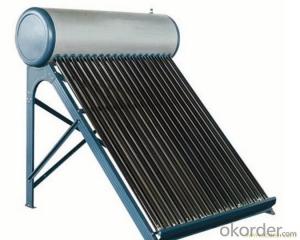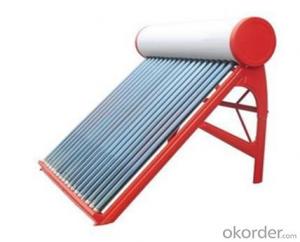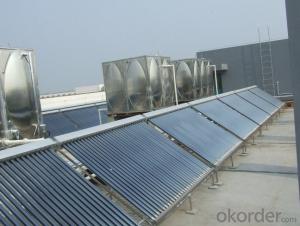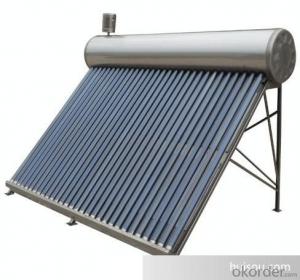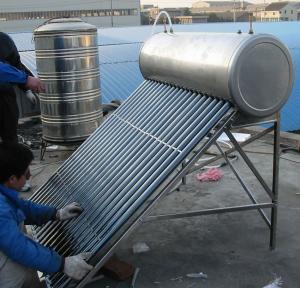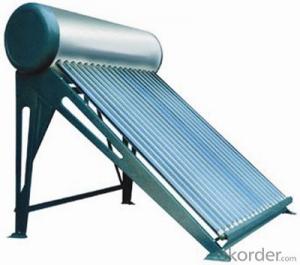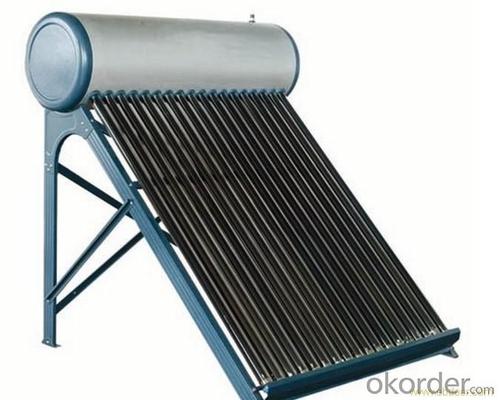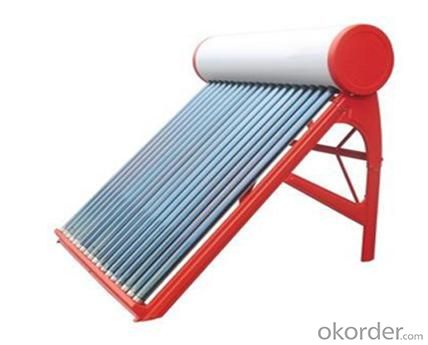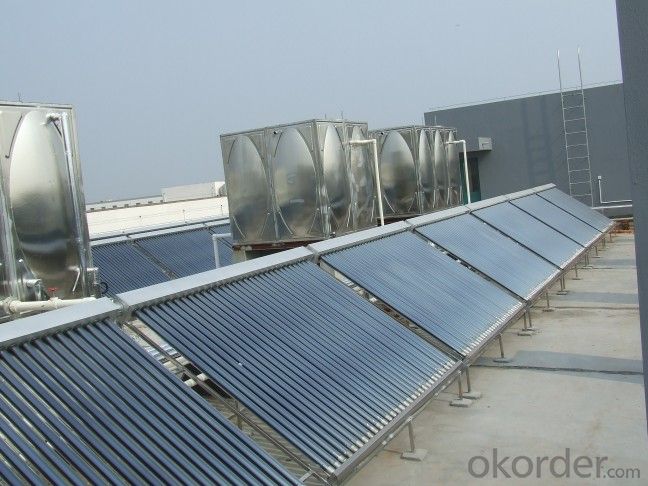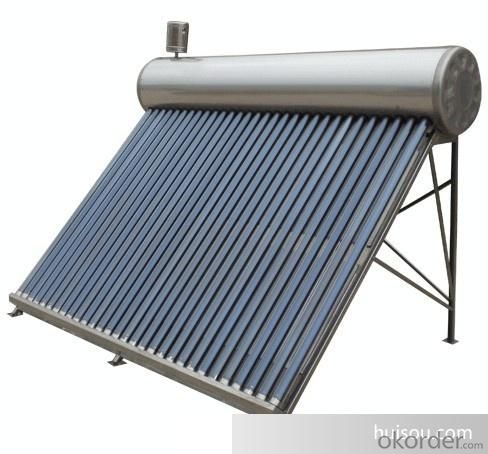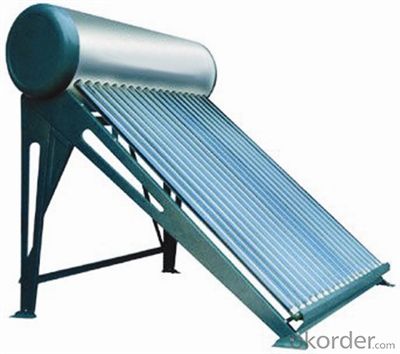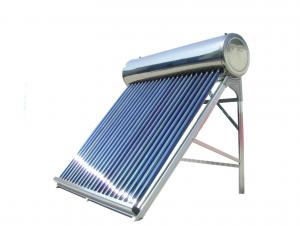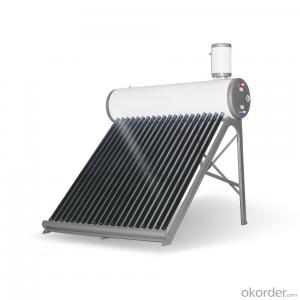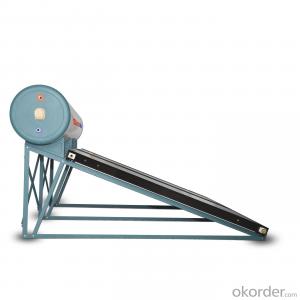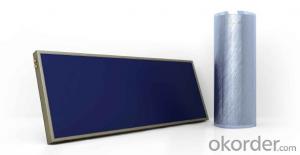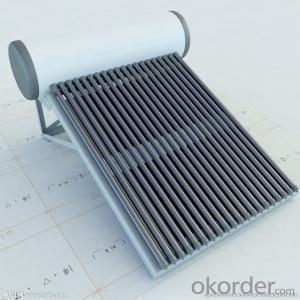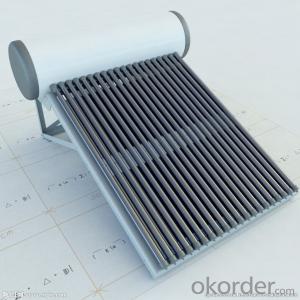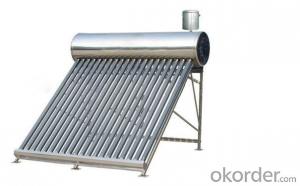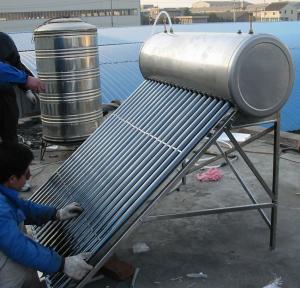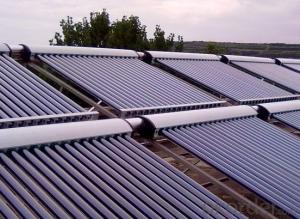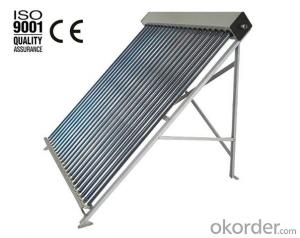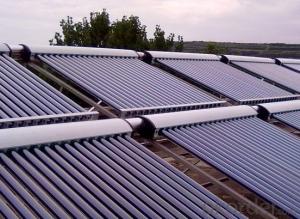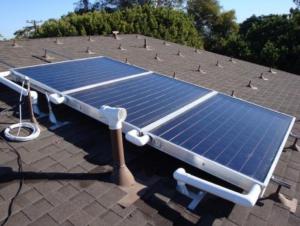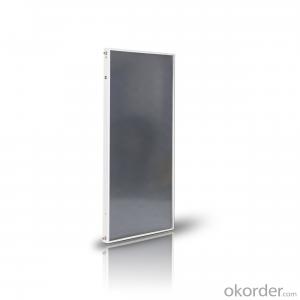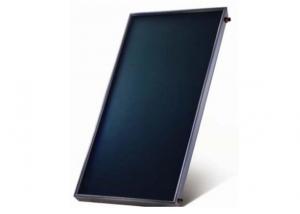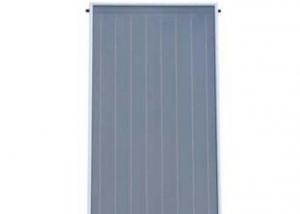Vacuum Tube for Solar Water Heater - 28 Tube Solar Collector China Top Supplier
- Loading Port:
- China main port
- Payment Terms:
- TT OR LC
- Min Order Qty:
- 10 set
- Supply Capability:
- 10000 set/month
OKorder Service Pledge
OKorder Financial Service
You Might Also Like
Introduction of Non-Pressure Solar Water Heater:
Non-pressure Solar Heater is one of the most economical solar water heating device with pretty high efficiency at the same time. It consists of hot water storage tank, solar vacuum tubes with mouth plug in storage tank, and bracket supporting tank and tubes.When cold water in evacuated tubes is heated with solar irradiation, as the specific gravities of hot water and cold water are different, hotter water goes upward to storage tank and colder water goes downward to glass tubes. through this continuous circulation, the cold water in storage tank will be gradually heated till sunset.
Solar water heaters working principle
1. The solar collector absorbs solar energy and transmits it to the solar water heater tank through circulation
2. When the temperature of the collector reaches the set value, the controller starts the circulation pump automatically
3. The circulation pump makes heat-conducting liquid circulate automatically
4. The heat-conducting liquid transfers heat to water by lower heat exchanger in the water tank.
5. When the temperature difference between solar collector and heat pipe solar water heaters tank doesn't reach the set value, the circulation pump will be shut automatically
6. In case the temperature of the water tank does not reach Tmax, Electric Heating Element will start to work automatically
Solar water heaters working station component:
1. Operating screen
2. Manometer
3. Pump speed adjust switches
4. Temperature difference circulation pump
5. Flow rate indicator
Solar water heaters specification:
Description | solar water heaters |
Material of out manifold | 0.55mm thickness color steel/ fluorine carbon steel |
Material of inner tank | Food grade 2.0 mm thickness SUS304 stainless steel |
Tank insulating layer | 40mm 45kg/m³ high-density polyurethane foamed |
Inlet and outlet hole | Male G1'' |
Max pressure | 0.6 Mpa |
Solar collector tube | 3.3 Borosilicate glass with N/Al coating |
Thickness of glass tube | 1.6mm |
Vacuum tube tightness | P≤0.005 Pa |
Absorption | as=0.93-0.96 (AM1.5) |
Emission ratio | εh=0.04-0.06 (80C±5C) |
Idle sunning property parameters | Y=220~260m2.C/KW |
Average heat loss coefficient | ULT=0.6~0.7W/(m2.C) |
Bracket: | 2.0mm thickness aluminum alloy |
Tank weight | 75KGS |
Tank size | 560mm Dia x 1810mm Height |
Tank capacity | 300L |
Solar collector | 2pcs 58x1800x15tube solar collector |
Absorber area | 2.811 m² |
Working station | SP116 working station |
Heat exchanger length | Upper:12m, Underside:18m |
Solar water heaters details show:
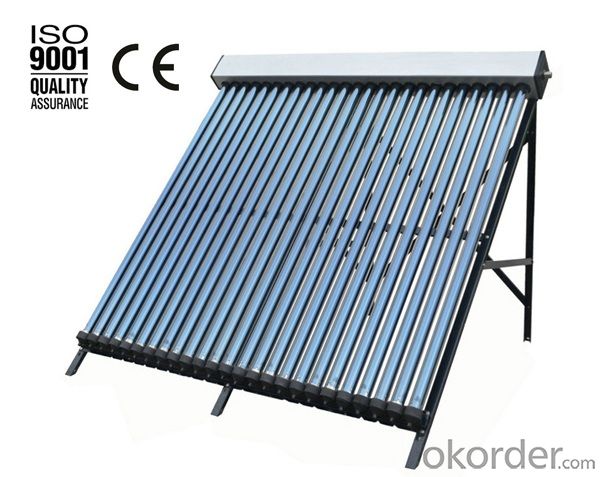
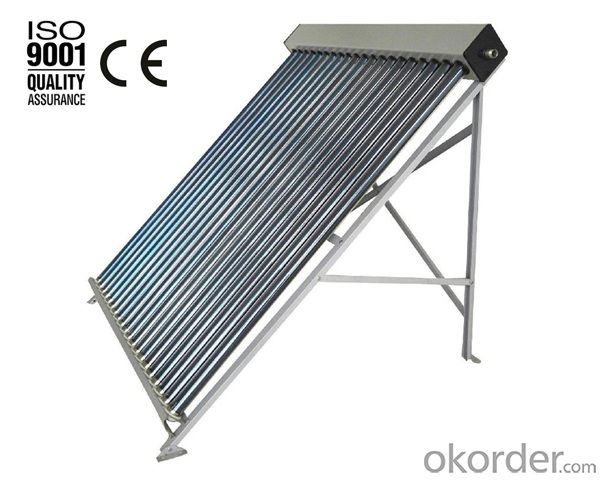
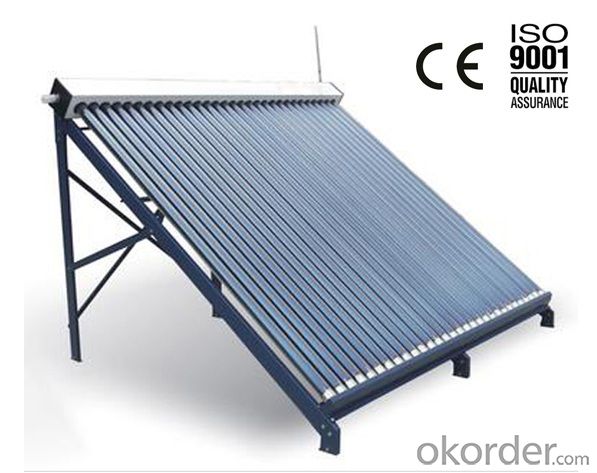
Benefits of this kind of solar water heaters:
1. Prolong the life of your existing water heater
2.Costs less than an electric, gas or oil water heater
3.No maintenance required
4.Lasts longer than a traditional hot water heater
5.Reduce your water heating costs
- Q: Do solar water heaters require maintenance?
- Yes, solar water heaters do require maintenance. Regular maintenance, such as checking for leaks, cleaning the collector surface, and inspecting the system's components, is necessary to ensure optimal performance and longevity of the solar water heater. Additionally, periodic inspections by a professional may be recommended to address any potential issues and maintain the system's efficiency.
- Q: What is the impact of nearby power lines or electrical infrastructure on the performance of a solar water heater?
- The impact of nearby power lines or electrical infrastructure on the performance of a solar water heater can vary depending on several factors. Firstly, if the solar water heater is installed in close proximity to power lines, it can be subjected to electromagnetic interference (EMI) caused by the electrical currents flowing through the lines. This interference can potentially disrupt the proper functioning of the solar water heater, leading to reduced efficiency or even complete malfunction. Moreover, power lines can create shading issues for the solar water heater. If the power lines cast shadows on the solar panels, it can significantly reduce the amount of sunlight reaching the system, thus lowering its performance. Shading caused by nearby electrical infrastructure can also result in hotspots, where certain areas of the solar panels receive uneven sunlight exposure, leading to a decrease in overall efficiency. Furthermore, the presence of power lines or electrical infrastructure can result in higher ambient temperatures in the vicinity of the solar water heater. The heat generated by the power lines can elevate the ambient temperature, affecting the efficiency of the solar panels. This increase in temperature can lead to a decrease in the overall performance of the system as solar panels typically perform better in cooler conditions. In conclusion, the impact of nearby power lines or electrical infrastructure on the performance of a solar water heater can be significant. It can lead to electromagnetic interference, shading issues, and elevated ambient temperatures, all of which can reduce the efficiency and effectiveness of the system. Therefore, it is important to consider these factors when selecting the installation location for a solar water heater to ensure optimal performance.
- Q: What is the difference between active and passive solar water heaters?
- Active and passive solar water heaters, two distinct system types, are employed to utilize solar energy for water heating. The key discrepancy between them lies in their water circulation and heat transfer approaches. Active solar water heaters employ pumps or mechanical devices to circulate water throughout the system. Typically consisting of solar collectors, storage tanks, and controls, these systems absorb the sun's heat through the collectors, usually positioned on the roof or in an area with ample sunlight exposure. The absorbed heat is then transferred to the water, which is subsequently pumped into a storage tank for various uses. Active systems are more intricate, necessitating electricity to operate the pumps, but they tend to be more efficient and capable of providing a continuous supply of hot water. On the contrary, passive solar water heaters rely on natural convection and gravity for water circulation, obviating the need for mechanical components. These systems usually comprise a solar collector and a storage tank, devoid of pumps or controls. The solar collector absorbs the sun's heat, causing the water within to heat up and naturally rise into the storage tank due to density disparities. As hot water is drawn from the tank, cold water is drawn into the collector, perpetuating a continuous flow. Passive systems are simpler and do not require electricity, but they may not be as efficient as active systems and may have limitations in terms of the quantity of hot water they can provide. In conclusion, the primary distinction between active and passive solar water heaters lies in their water circulation and heat transfer mechanisms. Active systems employ pumps and controls for circulation, offering higher efficiency, while passive systems rely on natural convection and gravity, resulting in simplified but potentially less efficient operation. The choice between the two is contingent on factors such as budget, energy requirements, and available space.
- Q: How does a solar water heater affect water heater heat loss?
- A solar water heater can significantly reduce water heater heat loss by utilizing the sun's energy to heat the water directly. This eliminates the need for traditional energy sources such as electricity or gas, which often result in heat loss during the heating process. Additionally, solar water heaters are equipped with insulation and efficient circulation systems, further minimizing heat loss and ensuring optimal energy utilization.
- Q: How does the size of a solar water heater system affect its performance?
- The size of a solar water heater system directly affects its performance as it determines the amount of hot water it can produce. A larger system with a larger collector area and storage tank can heat more water and meet higher demand, resulting in better performance. On the other hand, a smaller system may struggle to provide sufficient hot water, especially during periods of high demand or in colder weather.
- Q: What is the expected performance of a solar water heater in areas with high levels of air pollution from vehicles?
- The expected performance of a solar water heater in areas with high levels of air pollution from vehicles may be slightly impacted. The efficiency of the solar panels may be reduced due to the reduced sunlight reaching the panels through the polluted air. However, the overall performance of the solar water heater should still be considerable, as it primarily relies on the availability of sunlight rather than air quality. Regular maintenance and cleaning of the panels might be necessary to ensure optimal performance in such areas.
- Q: Can a solar water heater be used in areas with limited access to financial resources for installation or maintenance?
- Areas with limited access to financial resources for installation or maintenance can still benefit from the use of a solar water heater. Solar water heaters have several advantages that make them suitable for such areas. To begin with, solar water heaters make use of renewable energy from the sun, which is available for free in almost all parts of the world. This eliminates the need for expensive fossil fuels or electricity, making it a cost-effective solution for those with limited financial resources. Furthermore, solar water heaters have a relatively simple design and can be easily constructed using locally available materials. There are different types of solar water heaters, such as batch heaters, flat-plate collectors, and evacuated tube collectors. Depending on the specific requirements and available resources, a suitable design can be chosen and built with minimal investment. Additionally, solar water heaters require low maintenance. Basic cleaning and periodic checks are usually sufficient to ensure proper functioning. This can be done by the users themselves or by trained technicians from the community, reducing the need for expensive professional maintenance services. Moreover, there are numerous organizations and initiatives that aim to promote the use of solar energy in areas with limited financial resources. These organizations often provide financial assistance or subsidies for the initial installation cost, making it more affordable for the communities. In conclusion, solar water heaters can be a viable option for areas with limited access to financial resources for installation or maintenance. They provide a sustainable and cost-effective solution for heating water, improving the quality of life for communities by providing hot water for various domestic purposes.
- Q: Can a solar water heater be used in areas with limited access to spare parts or components for repairs?
- Certainly, areas with limited access to spare parts or components for repairs can still make use of a solar water heater. Unlike traditional water heaters that rely on electricity or gas, solar water heaters operate by harnessing the sun's energy. Their design consists of simple and durable components, such as solar collectors and storage tanks, which have a long lifespan and require minimal maintenance. Solar water heaters are built to endure harsh environmental conditions, and their components are generally sturdy and dependable. This means that the likelihood of experiencing a major breakdown or failure is much lower compared to other types of water heaters, even in situations where spare parts or components are not readily available. Consequently, they are highly suitable for areas with limited access to spare parts or repair services. Furthermore, solar water heaters are relatively easy to install and maintain. They lack complex mechanisms or moving parts, which reduces the need for frequent repairs. Regular maintenance tasks, such as cleaning the solar collectors or checking system connections, can be carried out without specialized skills or spare parts. In the event that repairs are necessary, there are still workarounds or alternative solutions available. Local craftsmen or technicians can often adapt and repair certain components using locally available materials or resources. Additionally, solar water heater manufacturers or suppliers may offer support and guidance on troubleshooting or finding suitable alternatives in case of component failures. Overall, the simplicity, durability, and flexibility of solar water heaters make them a viable choice for areas with limited access to spare parts or components for repairs. They provide a sustainable and reliable solution for heating water, even in challenging environments.
- Q: How does a solar water heater perform during cloudy days?
- During cloudy days, a solar water heater's performance is reduced as it relies on sunlight to generate heat. The efficiency of the heater decreases due to decreased solar radiation, resulting in lower water temperatures. However, modern solar water heaters are designed with backup systems, such as electric or gas heating elements, to ensure hot water is still available even on cloudy days.
- Q: What is the maintenance cost of a solar water heater?
- The maintenance cost of a solar water heater is relatively low compared to traditional water heaters. It typically involves routine inspections, cleaning of the panels, and occasional replacement of parts such as pumps or valves. The overall cost can vary depending on the specific model and any additional maintenance services required, but it is generally considered to be affordable and cost-effective in the long run.
Send your message to us
Vacuum Tube for Solar Water Heater - 28 Tube Solar Collector China Top Supplier
- Loading Port:
- China main port
- Payment Terms:
- TT OR LC
- Min Order Qty:
- 10 set
- Supply Capability:
- 10000 set/month
OKorder Service Pledge
OKorder Financial Service
Similar products
Hot products
Hot Searches
Related keywords
